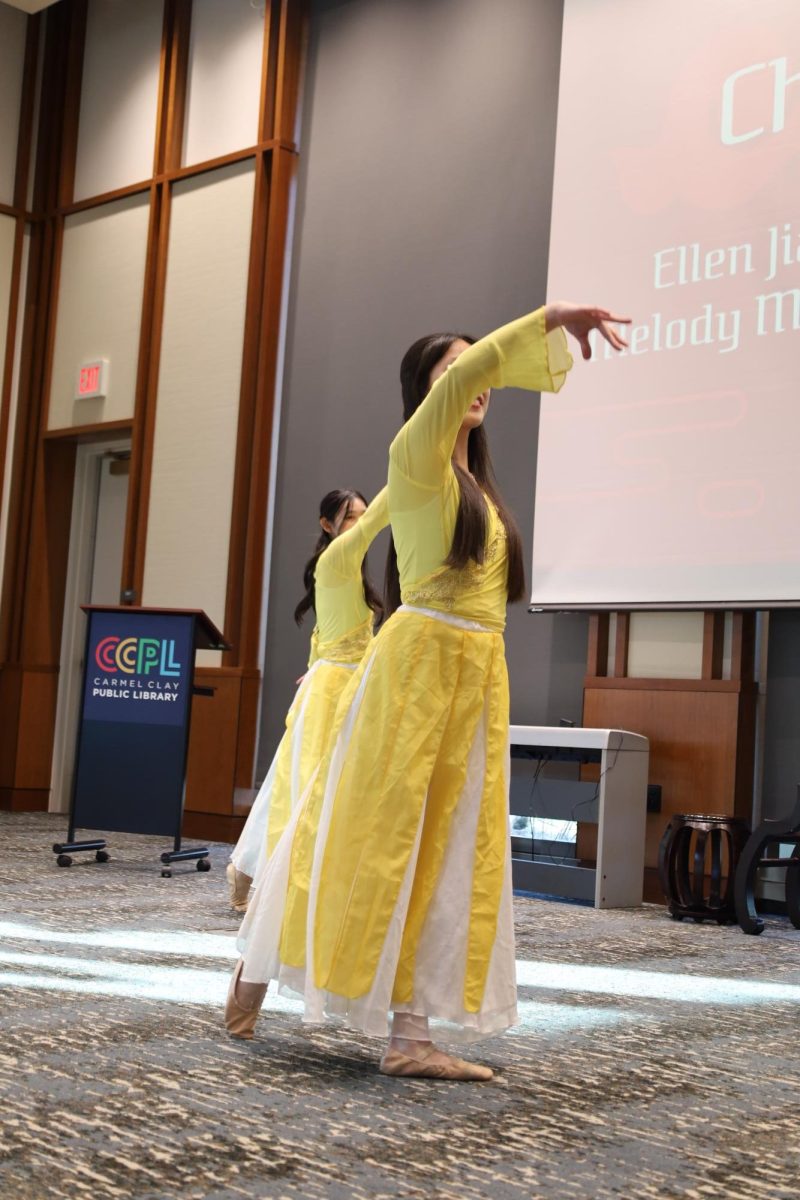During her freshman year, Meredith Baranowski, current Speaker of the House, walked into her first House meeting and saw a lone female on stage, Sunny Huang ’10, then Speaker of the House.
“My immediate first reaction was, ‘There’s a girl who looks like she has her stuff together’ and that was something that I might want to be and represent as well,” Baranowski said. “I was seeing that and thinking, ‘I can do that.’”
For the next two years, the Speaker of the House was male. But Baranowski never forgot the female who reassured her belief that a woman could also be a top school leader just as well as a man.
Baranowski’s term as Speaker comes in a time when the possibility of gender equality in leadership has both shown promise and sparked extensive debate. This school itself has seen a streak of male student body presidents, but females like Baranowski are rising to the top positions too. Nationally, leaders such as former secretary of state Hillary Clinton and more recently, Facebook’s Chief Operating Officer (COO) Sheryl Sandberg have become iconic figures in the women’s empowerment movement.

Sandberg has faced criticism for trying to be both a woman in a position of power and a mother, as a controversial article, “Women Can’t Have It All,” asserted in June 2012. In response, Sandberg recently released Lean In, a book that examines the reasons for the stagnation of women’s progress in leadership roles and offers women solutions and advice on how to be more successful. Her book has garnered extensive debate about whether women can truly achieve the same level of success in leadership as that of men.
Barriers to Women’s Leadership
The argument about women and leadership is no new debate. Forty-four years ago, Lorena Weeks became the first woman to use the Civil Rights Act to win the right to be promoted. Since then, there have been a multitude of female political leaders, corporate leaders, sports stars and world-changers. Women now make up nearly half of the workplace and have more college degrees than men, according the Pew Research Center. However, the percentage of female chief executives at Fortune 500 companies is only 4 percent, while the percentage of female national leaders is 10 percent. And these numbers are an all-time high.
Laura Foster, assistant professor of gender studies at Indiana University, cites intimidation and a lack of mentoring as factors leading to this gender gap.
“Women in the workplace have really struggled to find mentors that they can look up to. Not just mentors to tell them to do things, but mentors that can help direct projects towards them, speak highly of them and help guide their career,” she said. “Women are just disproportionately not in the top ranks in the companies.”
As for Baranowski, she said a lack of women in certain roles make other women less confident to strive for that position later.
“It comes down to who has held that position before them and if there was a history of women in that position, because then they’ll know if that door is open to them and if they can do that,” she said. “If only men have held (a position) before, it might be different.”
Senior Juliet Martone said it’s critical for women to be educated in the importance of overall gender equality and socioeconomic power if they want to strive for gender equality in leadership. Earlier this year, she traveled to the U.N. Headquarters in New York to attend the 57th Annual Commission on the Status of Women, which provided this kind of education.
 “(The conference) helped me gain my independence and realize that I’m more than what some people say and that I want to be a woman leader when I grow up,” Martone said. “Being a high school girl, you have a lot of influences that can hold you back, with insecurities, with different social expectations and with a lot of the derogatory language used in school.”
“(The conference) helped me gain my independence and realize that I’m more than what some people say and that I want to be a woman leader when I grow up,” Martone said. “Being a high school girl, you have a lot of influences that can hold you back, with insecurities, with different social expectations and with a lot of the derogatory language used in school.”
Baranowski said she believes another factor is that while men are not afraid to applaud their success, women are more self-conscious and less likely to promote themselves.
“Women are more concerned with what others think of them and coming off in a poor light,” she said. “I think that many men would not have any difficulty mentioning (their success), because it is, after all, fact, but women think, ‘Oh, this is going to make me sound like I’m tooting my own horn.’”
According to Foster, another major reason for the disproportional numbers is that women have trouble advancing in the workplace because of family needs.
“Historically, girls have seen their mothers and grandmothers having to choose between work and family, and they might think they have to choose,” she said. “When women enter the workplace and start to have children, they realize they have to make a choice putting either work or family first.”
Martone agreed that women stop reaching for new opportunities to focus on family.
“Women are the caregivers. When women are concerned about having a child, even 10 years down the road, they might dial it back a bit in work, they might think, ‘Oh, maybe I shouldn’t take this job because I have to start a family and I can’t afford to work all these hours,’” she said.
Where Women Come In
According to TIME Magazine, Sandberg is credited for building the business side of Facebook. Her colleagues compliment her on her practicality, her ability to make others feel like their contribution is significant and her high emotional quotient, the intuitive knowledge of how people feel.
Foster said while women are not necessarily more sensitive than men, female leaders are important because they have overcome more to gain their position and thus can make different contributions.
“They can bring a different level of experience based upon that they have struggled more through the process,” she said. “Anybody who has struggled through the process and fought their way up, they’re able to see things and mentor others in different ways.”
Senior Lauren Gibson, who started the Carmel Green Teen Micro-Grant Program in eighth grade, said she believes women can bring different perspectives than men.
“Different genders provide different perspectives. A mix of genders in a certain leadership group could definitely help a company become more successful,” she said.

Martone said to fully understand equal leadership potential, people need to get over the misconception and bad stigma of the term “feminism.”
“That’s a huge misconception: when people think of feminism they think of ‘girl power,’ ‘girls taking over men,’ and that’s false,” she said. “It’s about men and being equal, and I think we have the ability to be equal leaders, and that will create the best kind of society if men and women can rule equally.”
Time for Change
Many corporations and governments have tried to address the gender gap problem, according to TIME Magazine, but it has proved to be a significant challenge. Foster said by talking to the masses and by setting an example, women like Clinton and Sandberg have shed much light on this issue.
“There’s been a lot of progress. There’s more attention on it, there’s more women in the workplace now then there was, and there’s more women with levels of higher education,” she said. “‘I think anyone like Sandberg or Clinton or anybody who rises to that level of leadership and has done a tremendous amount of work should be admired and is a great model.”
Gibson shows this through example. As a little girl, she said she wanted to be the first female president, an ambition that was formerly met with surprise.
“People didn’t think I was completely out of my mind, but they thought I was very ambitious,” Gibson said. “But now, it’s not like that’s out of the question for a female to take that leadership position. As we become a more modern society and move towards gender equality, women are starting to have very high ambitions as well. Look at Hillary Clinton, look at a lot of the important political figures.”
Despite this progress, Foster said change is still very slow. She said for more change to be made, women empowerment advocates like Sandberg should also speak to not only women, but men, too.
“There needs to be more attention on what men can do to help women succeed in the workplace, too,” Foster said. “Until there’s more collaboration between men and women in the workplace and dividing up household duties, then that change is going to continue to be slow.”
However, she said females in this generation are finding themselves in a society that’s more easily embracing gender equality in leadership.
“I love how in this generation, girls grow up assuming that there’s equality,” Foster said. “Girls grow up more confident and realize that they have the right and ability to succeed. A lot more doors are open for women nowadays.”
However, Baranowski said she realizes gender equality in school may be easier to achieve than in the workplace.
“In school, there’s a mindset of fostering equality and fairness and we have administrators and teachers to regulate that. In the outside world, there’s no one monitoring that and it’s up to each individual person,” Baranowski said.
However, Baranowski said she believes change has been made.
“It’s due to the women that have come before us and have opened up these doors for us,” Baranowski said. “For women to run for those high positions, that’ll give that acknowledgement that that can be done and those doors can be open.”
As for Martone, she said she will always think women can have it all.
“I think women absolutely can have it all. They can have the most,” Martone said. “They have the power to make families and have children, they have the power to go to school, they have the power to inform others and better themselves, they have all the power in the world as long as they’re allowed to use it. One of my favorite sayings is, ‘The hand that rocks the cradle rules the world.’”































![AI in films like "The Brutalist" is convenient, but shouldn’t take priority [opinion]](https://hilite.org/wp-content/uploads/2025/02/catherine-cover-1200x471.jpg)













































![Review: “The Immortal Soul Salvage Yard:” A criminally underrated poetry collection [MUSE]](https://hilite.org/wp-content/uploads/2025/03/71cju6TvqmL._AC_UF10001000_QL80_.jpg)
![Review: "Dog Man" is Unapologetically Chaotic [MUSE]](https://hilite.org/wp-content/uploads/2025/03/dogman-1200x700.jpg)
![Review: "Ne Zha 2": The WeChat family reunion I didn’t know I needed [MUSE]](https://hilite.org/wp-content/uploads/2025/03/unnamed-4.png)
![Review in Print: Maripaz Villar brings a delightfully unique style to the world of WEBTOON [MUSE]](https://hilite.org/wp-content/uploads/2023/12/maripazcover-1200x960.jpg)
![Review: “The Sword of Kaigen” is a masterpiece [MUSE]](https://hilite.org/wp-content/uploads/2023/11/Screenshot-2023-11-26-201051.png)
![Review: Gateron Oil Kings, great linear switches, okay price [MUSE]](https://hilite.org/wp-content/uploads/2023/11/Screenshot-2023-11-26-200553.png)
![Review: “A Haunting in Venice” is a significant improvement from other Agatha Christie adaptations [MUSE]](https://hilite.org/wp-content/uploads/2023/11/e7ee2938a6d422669771bce6d8088521.jpg)
![Review: A Thanksgiving story from elementary school, still just as interesting [MUSE]](https://hilite.org/wp-content/uploads/2023/11/Screenshot-2023-11-26-195514-987x1200.png)
![Review: "When I Fly Towards You", cute, uplifting youth drama [MUSE]](https://hilite.org/wp-content/uploads/2023/09/When-I-Fly-Towards-You-Chinese-drama.png)
![Postcards from Muse: Hawaii Travel Diary [MUSE]](https://hilite.org/wp-content/uploads/2023/09/My-project-1-1200x1200.jpg)
![Review: "Ladybug & Cat Noir: The Movie," departure from original show [MUSE]](https://hilite.org/wp-content/uploads/2023/09/Ladybug__Cat_Noir_-_The_Movie_poster.jpg)
![Review in Print: "Hidden Love" is the cute, uplifting drama everyone needs [MUSE]](https://hilite.org/wp-content/uploads/2023/09/hiddenlovecover-e1693597208225-1030x1200.png)
![Review in Print: "Heartstopper" is the heartwarming queer romance we all need [MUSE]](https://hilite.org/wp-content/uploads/2023/08/museheartstoppercover-1200x654.png)



Valerie Martone • Apr 25, 2013 at 5:37 pm
Hi, wonderful article on girls and women empowerment. Juliet Martone is also the founder and club president of Girls Learn International at CHS, the first in the state of Indiana. Through GLI she was invited to participate as a student delegate in the United Nations 57th Annual Commission on the Status of Women and Girls held this past March in New York City, (for which she missed six days of school). Anyone interested in the learning more about the human right of girls education around the world can attend the weekly Wednesday meetings of Girls Learn International after school in the classroom of Ms. Erin Odya, and boys are members as well. Juliet also serves on the National Board of Directors for Girls Learn International and will intern at the GLI national headquarters in Los Angeles this summer.